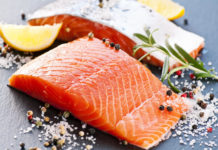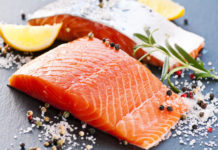
The keto diet is a weight loss trend that shows no signs of stopping. It can definitely be effective at shedding pounds, something that's on the minds of plenty of moms trying to drop baby weight. But is it safe to follow if you're breastfeeding?
A high-fat, very low-carb plan, the keto diet has been used for years to treat medical conditions like seizure disorders but has recently become popular for weight loss. The diet restricts the body's main source of energy (carbohydrates) and pushes it to use fat for energy instead. That puts your body into a state called "ketosis". Followers of the keto diet load up on meat, vegetables, high-fat dairy products like cream and butter, nuts, and coconut oil, but stay away from grains, fruit, beans, potatoes, and sugar.
There are upsides to the diet: Since the allowed foods are generally quite filling, it's easy to feel satisfied on fewer calories. Since it cuts out so many processed and packaged foods, you're automatically eating less added sugar and low-nutrient "junk". And as of now, there's no evidence that low-carb diets in general decrease milk production or hurt the quality of milk for breastfeeding moms.
But it might not be a wise move anyway.
"I can't endorse such an extreme eating plan for breastfeeding women," says dietitian and mom of three Elizabeth Ward, author of Expect The Best: Your Guide to Healthy Eating Before, During, and After Pregnancy. For one, the diet restricts mega-healthy foods like fruits and whole grains. "Inadequate intake of starchy foods, such as whole grains, potatoes, and beans, is bad news for gut health because beneficial bacteria feed on the fiber in those foods," she says. The high levels of fat, especially saturated fat, may not be good for heart health in the long-term either.
Because the diet dulls the appetite with so many filling foods like meat and high-fat dairy, it's also possible for breastfeeding moms to end up skimping on calories, which could reduce milk production.
Another concern is hydration. Breastfeeding women need at least 13 eight-ounces glasses of fluid daily for optimal milk supply, says Ward. But during ketosis, the liver produces compounds called ketones that are used by cells for energy then eliminated in the urine. "Ketosis can be dehydrating," she warns. Fruit, which naturally provides a rich source of fluids, aren't allowed on the diet either.
And if you're new to the keto diet, consider yourself warned: "Because it's so low in carbohydrate, the keto diet can mean tired mamas have to deal with excessive 'brain fog' during the first three or four days of diet," says Ward. The brain demands a lot of glucose, which is normally provided by carbs. When the body is learning to use fat for energy instead, you can feel fuzzy-headed—something that can make caring for a newborn feel even harder.
There's no evidence at the moment that there are risks (or benefits) to ketones in breast milk, but it's not a risk worth taking, advises Ward. "While mom's health matters, the baby's comes first, which is why we should err on the side of caution."
Sally Kuzemchak, MS, RD, is a registered dietitian, educator, and mom of two who blogs at Real Mom Nutrition. She is the author of The Snacktivist's Handbook: How to Change the Junk Food Snack Culture at School, in Sports, and at Camp—and Raise Healthier Snackers at Home. She also collaborated with Cooking Light on Dinnertime Survival Guide, a cookbook for busy families. You can follow her on Facebook, Twitter, Pinterest, and Instagram. In her spare time, she loads and unloads the dishwasher. Then loads it again.





